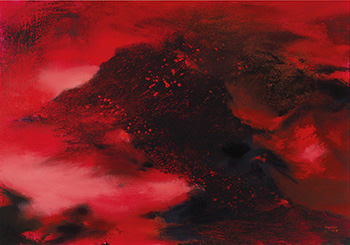Catalogue Note:
In all of Sophie Chang’s recent abstract paintings, she retains the imagery of the “universe of the mind.” It is as it one were to look down from outer space on the vast earth, on its majestic curves, and, standing on this shore, look into the infinite depths of space. The curiosities that make up her grand visual adventure are most certainly related to her admiration of mountains. She admires how the heights and depths of mountains and valleys impart in the viewer a sense of solemn respect. Thus, Chang’s abstract works often feature the grandeur of mountains. Her years of introspection in meditation have shown her reflections of both her own heart as well as the heart of the world. It is like seeing all of nature while floating in midair. These wonders of nature are presented from a silent, still inner self. Because of this, the external universe and the one within are equally distinct to the artist. Thus, Chang’s abstract works appear to stretch beyond the boundaries of time and space and lead the viewers deep into their own thoughts. “Peak of the Mountain” is one such work.
In “Peak of the Mountain,” a hazy red light surrounds a dark, heavy mass, looking as if a new beam of light is about to break from behind the mountain. Or as if the sun is rising from the peak of the mountain and above the chaos of the universe. Chang once mentioned that she had meditated in the mountains of Nepal at daybreak while facing the Himalayas. As she watched the sun rose over the mountains, bit by bit, the sky shifted from darkness, to grayish white, to scattered red rays of light that eventually filled the entire span of the horizon. “Peak of the Mountain” is a memory of that moment. The artist had broken free of the framework of “form” and diverged from its constructive components, purifying them into simple color and line. By Chang’s hand, a new interpretation of a “universe of the mind” was born. “Visually goes with any color when the viewers see it, so I didn’t need to hold back with my use of color or brushwork. If I say ‘It looks like a mountain,’ then it’s a mountain!” In addition, “Peak of the Mountain” brings together all of its components into one single body; it is as if an overflowing vitality flows through it that takes its viewers’ breath away.
In “Peak of the Mountain,” a hazy red light surrounds a dark, heavy mass, looking as if a new beam of light is about to break from behind the mountain. Or as if the sun is rising from the peak of the mountain and above the chaos of the universe. Chang once mentioned that she had meditated in the mountains of Nepal at daybreak while facing the Himalayas. As she watched the sun rose over the mountains, bit by bit, the sky shifted from darkness, to grayish white, to scattered red rays of light that eventually filled the entire span of the horizon. “Peak of the Mountain” is a memory of that moment. The artist had broken free of the framework of “form” and diverged from its constructive components, purifying them into simple color and line. By Chang’s hand, a new interpretation of a “universe of the mind” was born. “Visually goes with any color when the viewers see it, so I didn’t need to hold back with my use of color or brushwork. If I say ‘It looks like a mountain,’ then it’s a mountain!” In addition, “Peak of the Mountain” brings together all of its components into one single body; it is as if an overflowing vitality flows through it that takes its viewers’ breath away.
